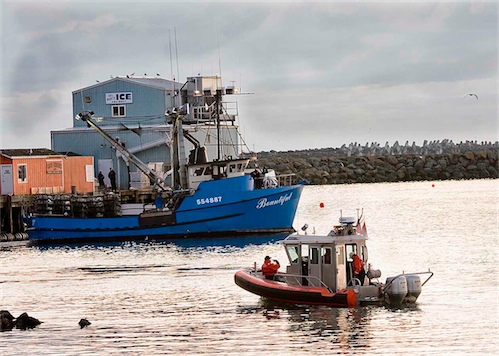

 |
|
Flotilla 8-11 Patrol |
When two concerned citizens didn’t get what they asked for after a tragic accident off the Crescent City (CA) jetty near Battery Point Lighthouse, the events that followed would lead to the formation of a United States Coast Guard Auxiliary Flotilla in Crescent City.
Following the sinking of the commercial fishing boat the F/V Paul C on December 15, 1999, which resulted in the loss of the lives of two local crab fishermen, Bev Noll, a former commercial fisherman, and Mary Messal, a then-active member of “The Commercial Fishermen’s Wives Association,” campaigned for increased Coast Guard protection for offshore boaters in the Crescent City area.
As it is now, the Coast Guard Cutter stationed at Whaler’s Island in Crescent City was often away on maneuvers at sea and unavailable for local open ocean rescue. The closest lifeboat stations, intended for near shore patrol, were at Humboldt Bay, and Brookings, OR., both too distant for timely response to the fishing grounds off Crescent City.
After soliciting the help of Congressman Mike Thompson, negotiations with the U.S. Coast Guard began, resulting in several visits to Crescent City by Coast Guard personnel.
Noll then flew to Washington DC, representing The Commercial Fishing Industry Vessel Safety Committee, and while there, continued the lobby for a small boat station in Crescent City. In the end, however, the Coast Guard maintained it just did not have the resources to meet the request, and according to Bev Noll, the final visiting Coast Guard representative said, “Let’s see what the community is willing to pony up.”
Both Noll and Messal accepted the statement as a challenge, and proceeded to organize and arranged to train sixteen of their friends and relatives. As a reward for the effort the Coast Guard presented them with the keys to a boat and at that moment Crescent City became the home of the first-ever U.S. Coast Guard Auxiliary organization to operate an official Coast Guard watercraft in open Pacific Ocean waters for search and rescue purposes. The first Coast Guard boat they received was a twenty foot rigid hull inflatable (RHI) that became surplus to the Coast Guard when they were replaced by more current technology.
Beginning Friday November 4th, Flotilla 8-11 will host a 10th Anniversary Celebration in Crescent City. The event will be attended by both Coast Guard and Coast Guard Auxiliary personnel, plus friends and guests. Saturday’s activities will include skill related competitions at the Coast Guard Station and conclude with a banquet at Veteran’s Memorial Hall.
Flotilla 8-11 is now on its third Coast Guard boat and continues to provide open ocean rescue response for the Crescent City commercial and sport boating community. Dispatch orders predominately originate from the Coast Guard at Humboldt Bay, and coordination with any other agency is arranged at that level.
Some years as many as 40 requests for assistance have been answered by the local Flotilla. Skill levels for the boat crews are set by Coast Guard standards and are monitored closely by the Coast Guard. Training is on-going.
In 2006 a Flotilla 8-11 boat crew flew to Cape May, N.J. to compete in the National Search and Rescue Competition. They returned home national champions.
In addition to search and rescue, the Coast Guard Auxiliary in Crescent City teaches boating safety courses, offers free boat safety inspections that qualify the boat owners for discounts with many insurance companies and provide local children with free life jackets.
They also stand ready to assist the Coast Guard whenever necessary. On March 11, 2011, a tsunami, generated by severe earthquakes in Japan, caused catastrophic damage to the Crescent City harbor, sinking many of the moored fishing and pleasure vessels. The Coast Guard immediately took charge and started the process needed to minimize environmental.
The Coast Guard requested the Auxiliary be part of the team. Auxiliary members, with local knowledge, helped build a successful liaison between emotionally charged boat owners and the agencies delegated to do the work. The initial tsunami response was considered by most to be a success, and Flotilla 8-11 received recognition and an award from the Coast Guard for their participation.
~CC 12-16-11